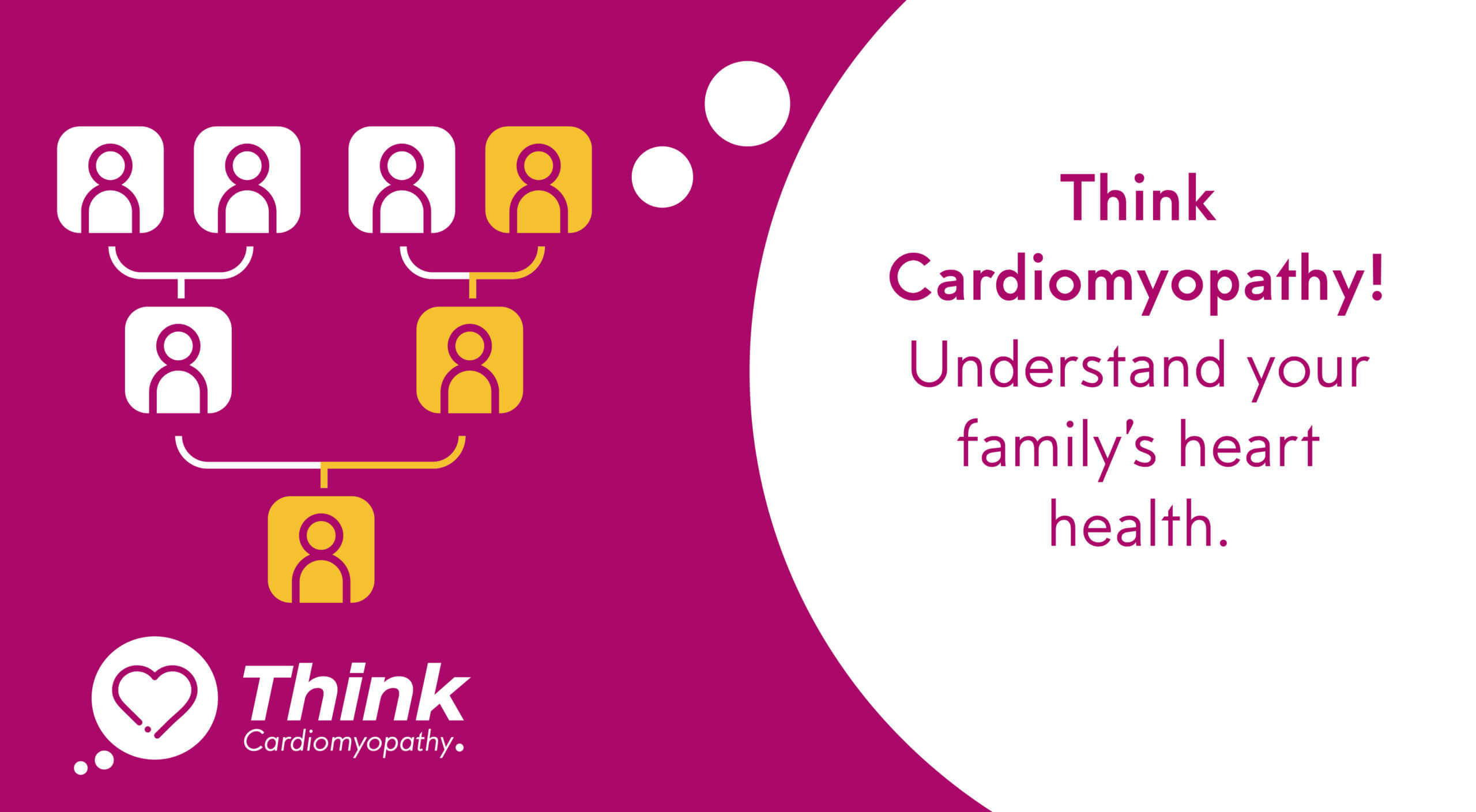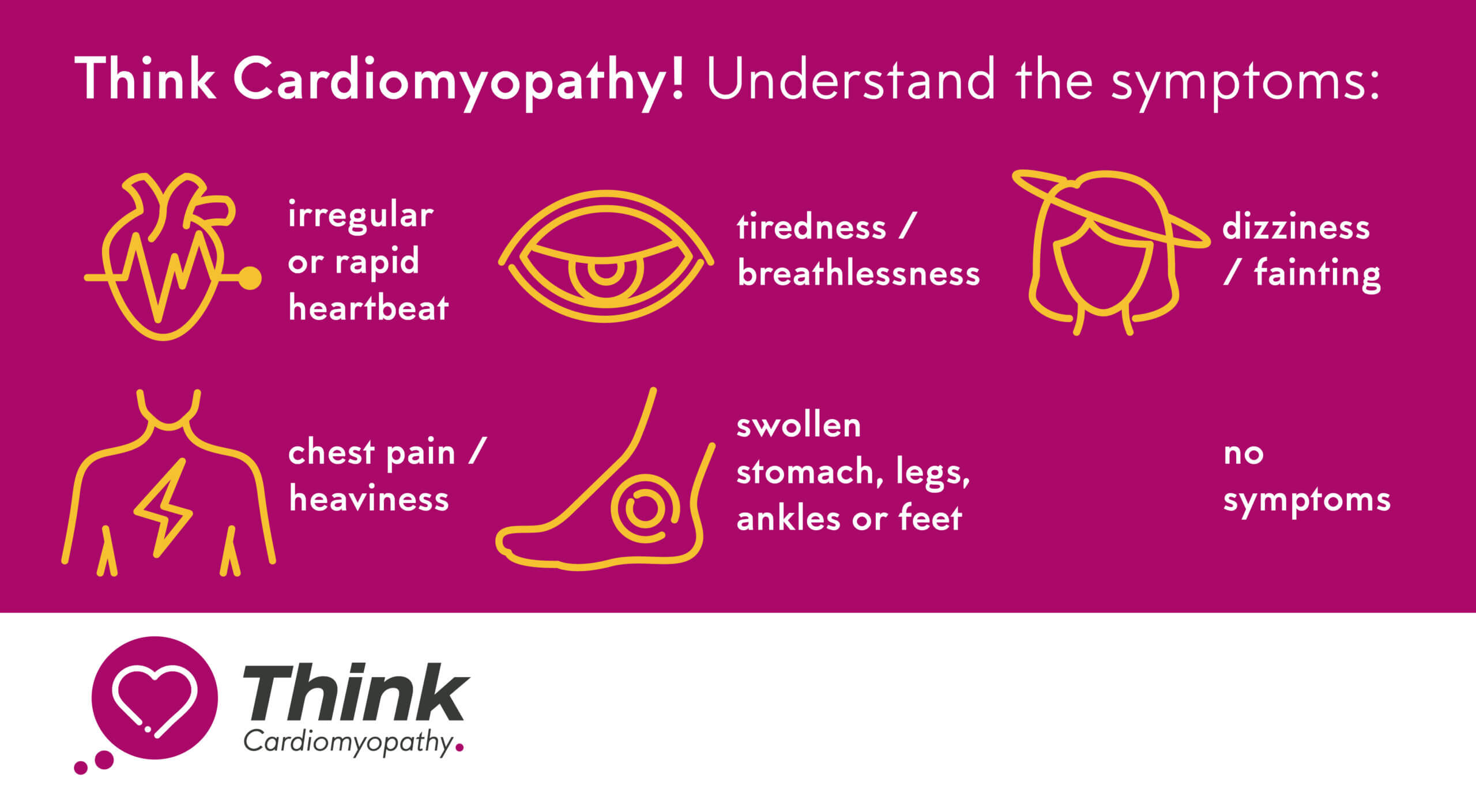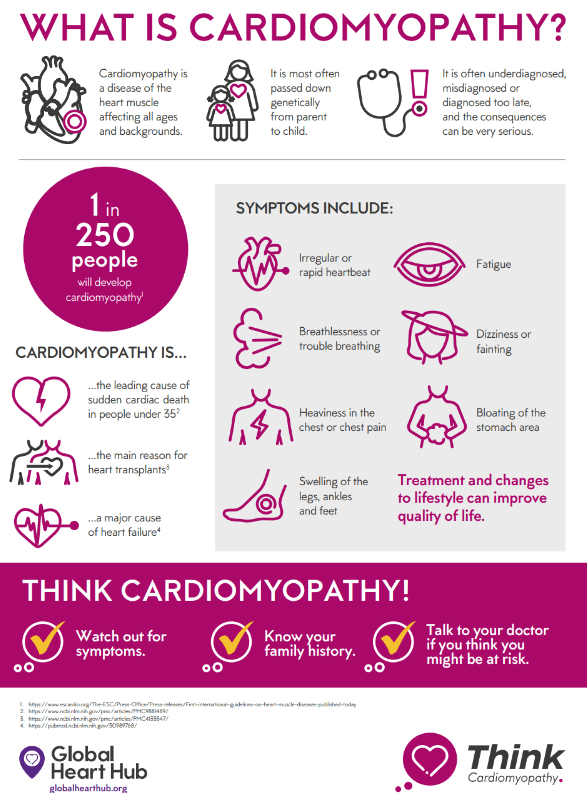Cardiomyopathy is a disease of the heart muscle that can occur at any age and can be passed down genetically. 
- Cardiomyopathy is a relatively common, yet little-known group of diseases of the heart muscle that tend to progress over time and affect the heart’s ability to pump blood through the body and/or cause irregularity of the heart rhythm.
- Cardiomyopathy is a primary disease of the heart muscle that is not caused by heart valve disease or other conditions that increase pressure on the heart.
- It can affect people of all ages and races and is most often passed down genetically.
- Prevalence varies based on type, but overall, cardiomyopathy affects around 1 in every 250 people worldwide.
- Some types of cardiomyopathy are more common than others or more common in certain ethnic groups than in others.
- There are various types of cardiomyopathy, each with unique characteristics and potential impacts on health. The three main types of cardiomyopathy are:
- Dilated cardiomyopathy (DCM) – the most common type of cardiomyopathy; is inherited in up to 40% of cases; causes the muscle of the heart chambers (ventricles) to become weakened and enlarged.
- Hypertrophic cardiomyopathy (HCM) – the most common inherited cardiomyopathy; characterized by the thickening of the main pumping chamber of the heart (the left ventricle); the left ventricle generally becomes stiffer over time and less capable of taking in or pumping out blood.
- Arrhythmogenic cardiomyopathy (ACM) / Arrhythmogenic right ventricular cardiomyopathy (ARVC)] – an inherited form of cardiomyopathy that is characterized by progressive replacement of the heart muscle with scar tissue, causing heart rhythm irregularities (arrhythmias).
Often underdiagnosed, misdiagnosed, or diagnosed too late, the consequences of cardiomyopathy can be very serious.
- Inherited cardiomyopathy is the most common form of genetic heart disease.
- Cardiomyopathy is a predominant cause of sudden cardiac death in individuals under 35.
- Cardiomyopathy is an important cause of heart failure and the leading reason for needing a heart transplant.
- If untreated, cardiomyopathy can weaken the heart, leading to complications and to more serious conditions.
Cardiomyopathy can interfere with day-to-day life and, in severe cases, can lead to heart failure and sudden cardiac death.
- Signs and symptoms of cardiomyopathy can vary widely. In its earliest stages, cardiomyopathy may not have symptoms and some individuals may not notice symptoms that are mild.
- For others, symptoms interfere with day-to-day life and worsen over time, and can include irregular or rapid heartbeat (palpitations or arrhythmia), fatigue, feeling out of breath or having trouble breathing, dizziness or fainting, heaviness in the chest or chest pain, bloating of the stomach area, swelling of the legs, ankles, and feet.
- Cardiomyopathy can lead to severe manifestations, including heart failure and sudden unexpected death, even in people with minimal or no symptoms.
Signs, symptoms, and family history matter and are important to address with a doctor. 
- It’s time to take notice of cardiomyopathy. You or a loved one could unknowingly be at risk.
- Paying attention to symptoms, knowing your family history, and seeking care could be lifesaving.
- It’s important to talk to your doctor if you notice any symptoms or if you have a family member family history of heart disease or a close relative (parent, sibling, child) who died suddenly and unexpectedly at a young age.
- Knowing if you have an inherited type of cardiomyopathy is important because it can impact the risk for other family members. Genetic testing can help other family members to know if they also have a genetic predisposition and help protect them.
“Think Cardiomyopathy” Global Awareness Campaign
Led by GHH’s Cardiomyopathy Patient Council which has 24 patient organization affiliates across 15 countries, this year’s campaign focuses on patient and advocate stories on the impact of cardiomyopathy and the importance of recognizing symptoms and knowing your family history.
“Cardiomyopathy is too often underdiagnosed, misdiagnosed or diagnosed too late. It is the predominant cause of sudden cardiac death in people under 35. We want to raise awareness and encourage people to ‘Think Cardiomyopathy’ by helping people recognize the signs and symptoms (which can be subtle) and knowing their family heart history, especially if they have lost a family member too early to heart disease. Many types of cardiomyopathy are inherited and can impact the risk for other family members,” says Leigh Bell, the new Chair of Global Heart Hub’s Cardiomyopathy Patient Council and President of the Cardiomyopathy Association of Australia.
Learn more about the campaign here: https://globalhearthub.org/think-cardiomyopathy/










